The Gay History of Velma in ‘Scooby-Doo’
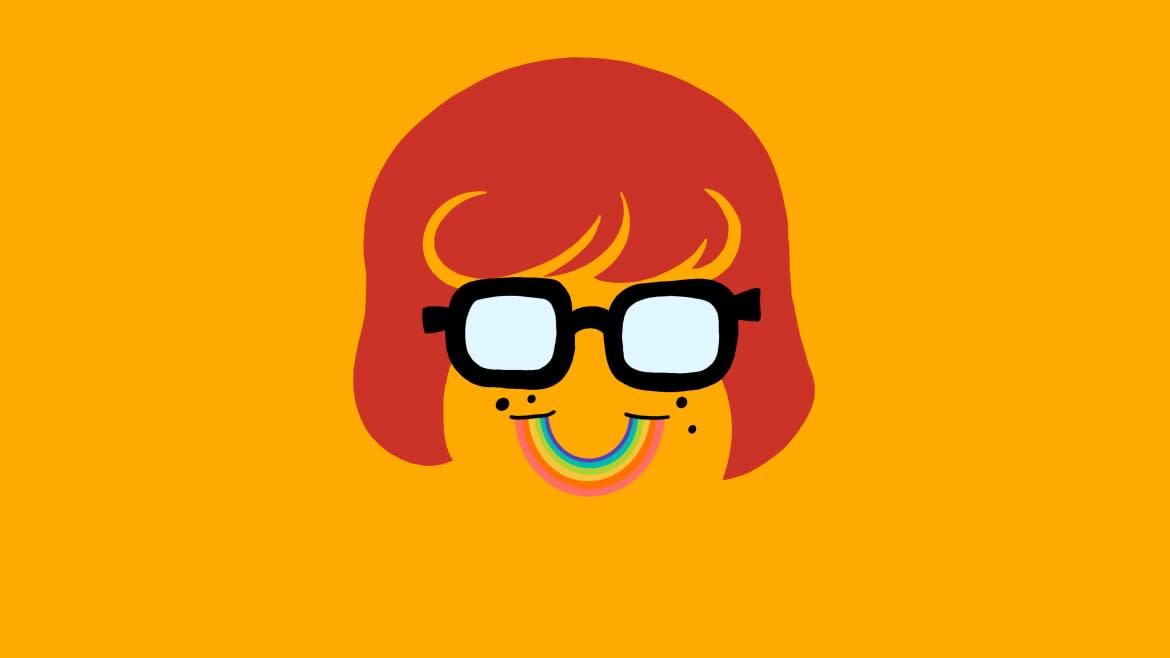
- Oops!Something went wrong.Please try again later.
Imagine a world where you’re a lesbian. Now imagine you’re the only lesbian at a family function. And despite the fact that you don’t hide your lesbianism, people keep asking about a future boyfriend or fail to remember who your long-term girlfriend is.
Frustrating, I know. But that’s kind of what happened to Scooby-Doo’s Velma Dinkley. Except instead of a family function, it’s decades of TV and movies, and instead of “forgetful” family members, Velma had studio execs distancing themselves from the fact that she’s been purposely queer-coded for years.
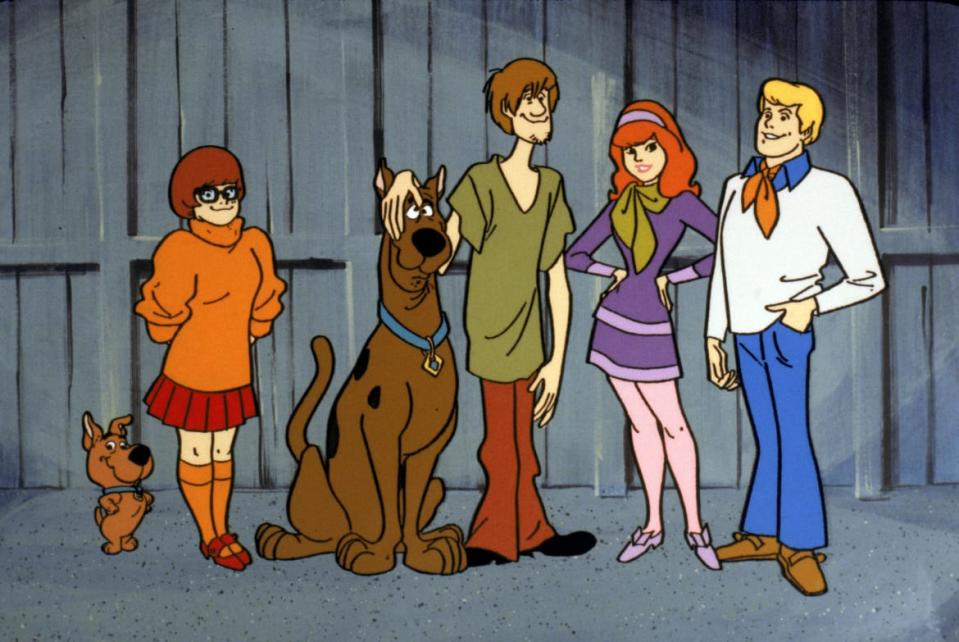
Yes, Velma is a cartoon character, whose roots date back to 1969, in the original Hanna-Barbera Scooby-Doo series. But even the 1970s were no match for her inherent sapphic nature, like knowing what Daphne’s moans sound like. Subtle lines like that, or the fact that Velma never really had a long-lasting love interest, are what got—and has kept—the lesbian headcanons rolling. If we can’t get gay representation, we’ll create it, and that especially goes for lesbians.
Gay and Raunchy ‘Velma’ Series Hilariously Reinvents ‘Scooby-Doo’ for Adults
But Velma being gay isn’t just something in queer people’s minds. In addition to her funny comments in the 1970s, creators have been trying to portray Velma as openly gay for decades. Take the hit live-action Scooby-Doo movie, for instance. Release in 2002, it starred a stacked cast of actors, including Sarah Michelle Gellar as Daphne, Freddie Prinze, Jr., as Fred, Matthew Lillard as Shaggy, and Linda Cardellini as Velma. James Gunn, who wrote the script, has been open about the fact that he originally wrote the movie for adults—and that one key part of the original concept included Velma being a lesbian.
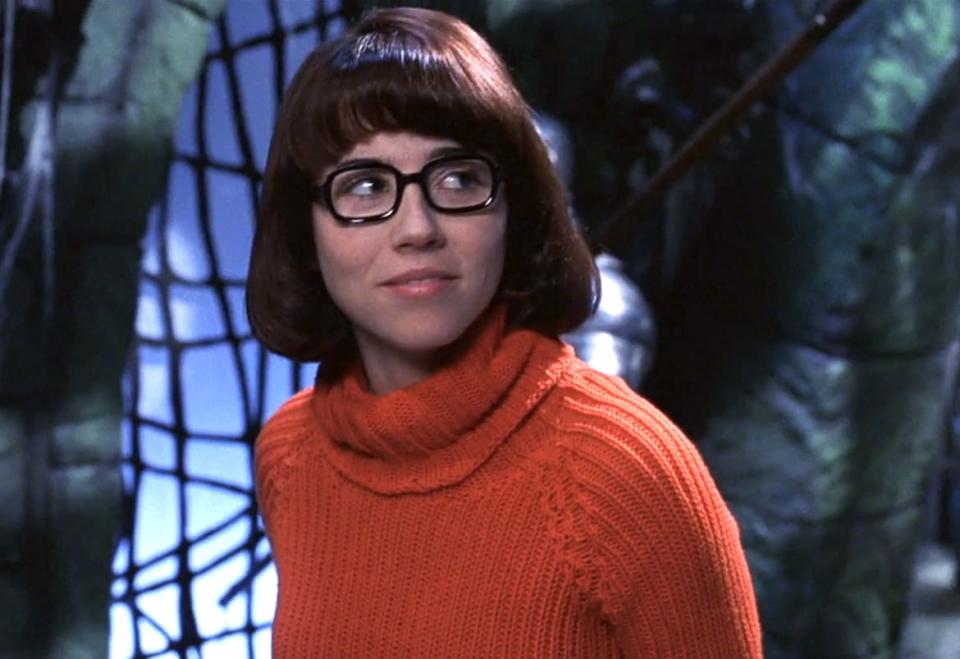
In 2020, a fan on Twitter urged Gunn to make a third Scooby-Doo movie, this time featuring a queer Velma. According to IndieWire, the filmmaker tweeted back that he tried to do this once before. “In 2001 Velma was explicitly gay in my initial script,” he wrote in a now-deleted reply. “But the studio just kept watering it down and watering it down, becoming ambiguous (the version shot), then nothing (the released version), and finally having a boyfriend (the sequel).”
Despite casting Seth Green as a love interest for Cardellini’s Velma, 2004’s Scooby-Doo 2: Monsters Unleashed also featured a faintly homoerotic energy between Daphne and Velma. It was a tension that young sapphics know well: common teenage feelings for close female friends before realizing they’re gay.
But going back to the first movie, you can still spot possible hints Gunn was able to leave in the script (but not the final cut) to Velma’s queerness. One deleted scene shows Velma “drunk” on some non-alcoholic drinks at a Spooky Island bar, singing a rendition of “Can't Take My Eyes off You” by Frankie Valli. Her moment as a cabaret singer starts when she spots Daphne coming down the stairs. Granted, Fred was coming down at the same time too. But considering Gunn intended for Velma to be “explicitly gay,” it’s easy to imagine that “drunk” Velma was in her feels about an unrequited crush on Daphne Blake.
That was over 20 years ago, and since then, we’ve met another, even gayer iteration of Velma. Tony Cervone, the co-creator of the 2010 cartoon Scooby-Doo! Mystery Incorporated, wrote in a June 2020 post that his team wrote Velma as gay. “We made our intentions as clear as we could ten years ago,” the post reads.
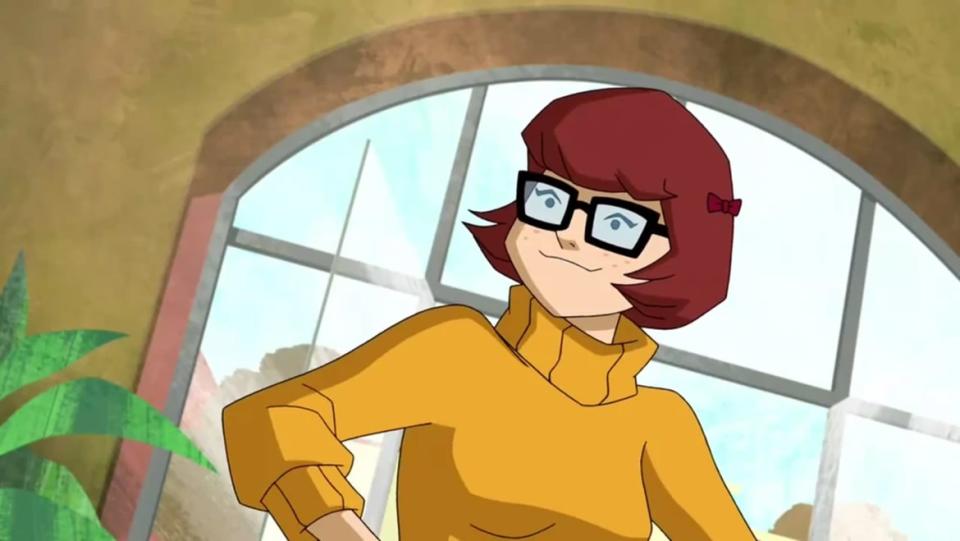
In this series, Velma has a close friend named Marcie whom many fans shipped her with, even though they weren’t outwardly together on the show. “Most of our fans got it,” Cervone wrote. “To those that didn’t, I suggest you look closer. There’s no new news here.” And according to screenshots from Out Magazine, before Cervone turned his comments off, he replied to a user clarifying that Velma is “not bi. She’s gay.” That’s why she couldn’t sustain her romantic relationship with Shaggy, which Velma said always felt off to her in this series.
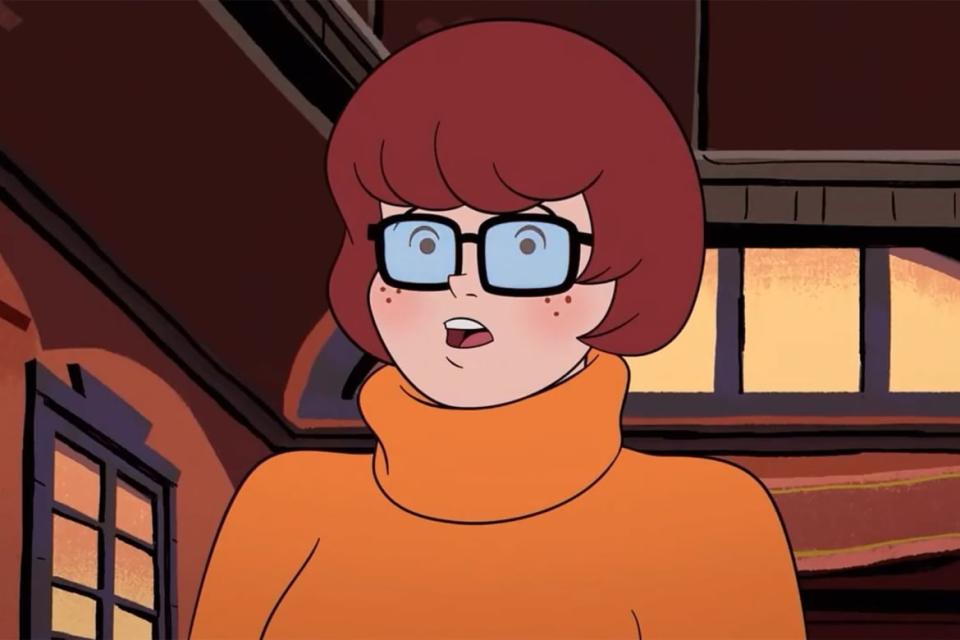
That whole journey toward open queerness culminates in Velma Dinkley being undoubtedly gay in October 2022’s Trick or Treat Scooby-Doo!, a 75-minute Halloween special. When Velma first locks eyes on Coco Diablo, she stutters and shuts down, leaving only blushing cheeks and fogged-up glasses in her wake. Velma admits to Daphne later on that she’s “crushing big time.” There’s no queer-coding needed here; in this film, Velma Dinkley is a big ol’ lesbian, which is only solidified by her paralyzing fear about what to do with a new crush.
OMG LESBIAN VELMA FINALLY CANON CANON IN THE MOVIES LETS GOOOOOO pic.twitter.com/0ilx2uid1q
— Trin ❄️ (@MythicalLlamaXO) October 3, 2022
This wasn’t shocking to the many fans who had long thought of Velma as a lesbian, although it was very much appreciated and celebrated. That is especially true for the actresses who had the chance to embody Velma in recent years. A month after the Halloween special’s release, Linda Cardellini praised the character development in an Entertainment Weekly interview. It was “great that it’s finally out there,” she said, noting that Velma’s lesbianism had “been hinted at so many times.”
Lesbian Jesus herself, singer/actress Hayley Kiyoko, also praised Velma’s overdue coming-out moment. In several tweets, Kiyoko reminisced about her time voicing Velma, back in 2009 and 2010. “I remember booking [the voice role of] Velma in 2008. It was my first big role in a movie,” she tweeted in October, in response to the reveal that Velma was now out. “I also remember thinking ‘I wonder if they know they hired a lesbian as Velma’ here we are, 14 years later…” Kiyoko also went on to tweet that “I feel alive and seen,” when a fan asked how she was doing following Velma’s open lesbianism.
Hayley Kiyoko and King Princess: The Radical Joy of Love Songs for Queer Kids
And that, right there, is probably the best and most succinct description of why Velma’s queerness being confirmed is such a big deal. The topic of why representation matters is a routine conversation at this point. But marginalized communities continue to talk about it, because it is such a validating experience to see yourself on screen. It’s significant to see your sexuality, specifically, portrayed as normal and sweet because that’s exactly what it is, just like straight crushes are on-screen. Velma represented that awkward girl who doesn’t fit in but never tries too hard to do so, either.
Outside of a few big exceptions (like the leather orange jumpsuit from Monsters Unleashed that awakened many people’s sexualities), Velma is fine living in her “weirdness” of being the girl with a nasally, nerdy voice, big sweater, and glasses. She never felt right dating men, but she of course craved some level of male validation; lesbians old and young still deal with that too. But under it all, she was just a lesbian who wasn’t given the footing she needed to come out. With lesbians and queer people clinging onto Velma’s queer-coded character for decades, her “coming out” was a dream come true for headcanon-ers everywhere.
But Velma’s significant, long-awaited coming out came with (unsurprising) backlash. The Laura Ingrahams of the world blew up about Velma’s queerness “disrupting… beloved characters,” as the hosts of The Young Turks podcast put well in a recent episode. Apparently, there’s “no innocence” left in the world with this newest checkmark in the gay “agenda;” what are studios going to “sexualize” next?
Despite the obvious and sad fact that conservative commentators are getting sexual orientation confused with sexual desire, it’s interesting that a fictional person revealing that they’re lesbian or queer is inherently sexual to these detractors. And a lot of media for children and families has included sexual jokes of the straight variety (looking at you, Shrek and SpongeBob). But apparently, sex sells until you make it gay.
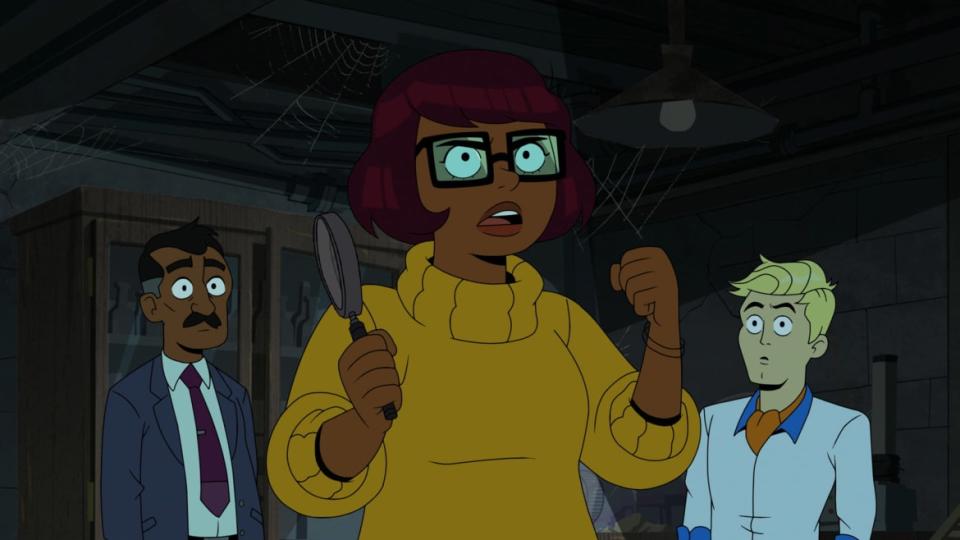
Despite the pushback, in HBO Max’s new, adult-oriented cartoon Velma, Velma’s sapphic journey lives on. While some fans are understandably annoyed that this new iteration of the character (voiced by Mindy Kaling) has a crush on Fred (Glenn Howerton), the series does make it a point to note that she’s a high schooler figuring out her sexuality. Of course she has the hots for the conventionally attractive jock. But Velma also has a newfound crush on a lifelong female friend. (You can guess which one.)
Having Velma come out in another part of the Scooby-Doo universe and then seemingly “erasing” it in another might be disappointing. But the series does lean into the character’s history and queerness, while also giving fans a little something else in canon that they've wanted for decades.
With or without the haters, Velma Dinkley is a lesbian. And just as real-life lesbians are used to, she’s going to continually have her sexuality diminished or “forgotten” because the greater society can’t possibly imagine a world where male validation and desire aren’t the most important things in a woman’s life. But as sure as Velma’s habit for saying “Jinkies” or not being able to see without her glasses, she’s a lesbian and always has been.
Get the Daily Beast's biggest scoops and scandals delivered right to your inbox. Sign up now.
Stay informed and gain unlimited access to the Daily Beast's unmatched reporting. Subscribe now.

